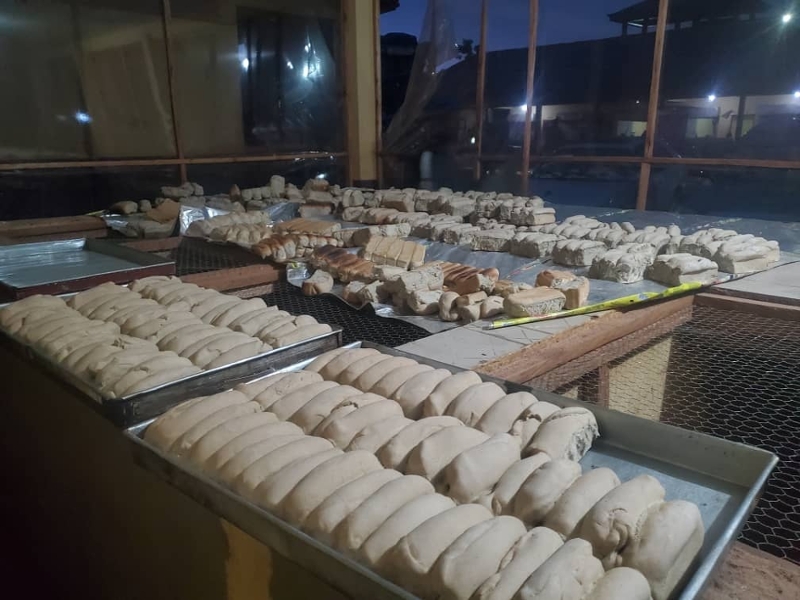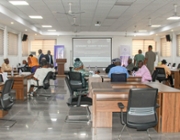Decentralisation in Cameroon yielding results

15 September 2025
Nkambe Council in Cameroon has demonstrated how to use the initial investment provided by CLGF for a pilot project to leverage a wider programme of investment.
Nkambe Council is bordered by Misaje, Ako, Nwa, Ndu and Nkor councils and is the divisional headquarters of Donga-Mantung Division. It is one of the main councils fully embracing the ongoing government decentralisation.
Aims and objectives
The goal of the project was to contribute to improving food security in Nkambe and neighbouring areas with the specific objective of strengthening the capacity of farmers and Nkambe council in better sweet potato cultivation practices, processing and marketing. More specifically, in Nkambe and neighbouring areas, the project was designed to enable farmers and the Council to develop improved sweet potato cultivation practices, processing and marketing.
Sweet potatoes
The Council decided to focus on the sweet potato value chain in their project for some well-thought-out reasons. Sweet potato is a popular food in many parts of Cameroon and can be grown throughout the Donga Mantung Division. Tolerant to droughts, hardy and able to grow in marginal areas, it takes just three months or so to mature. This encourages multi-cycle cropping, providing a continuous supply of the tubers needed for the processing unit, which is critical to improving food security. Sweet potato flour also offers several health benefits ranging from Vitamin A and fibre, and it is also a resistance starch. Additionally, it is very good for gluten intolerant diets and a good option for import substitution than other tubers and plantains. The young leaves and vines can be consumed as vegetables or fed to livestock and detailed knowledge on agricultural practices is not a prerequisite.
Dangers to crop production
The practice of on-farm storage, however, exposes the produce to various infestations and decay leading to post-harvest losses. With farmers lacking processing skills, particularly with flour, serious post-harvest losses are experienced, depriving the people of Nkambe, as well as other councils in Donga Mantung, from all the potential benefits of sweet potato production. These benefits range from food security enhancement, to income generation and, consequently, employment opportunities.
Potential markets
Nkambe has been relatively safe following the socio-economic crisis in the north west and south west regions of Cameroon started, which has led to the massive influx of internally displaced people (IDPs) into the town. This increased population provides a steady market for the project’s products. Additionally, Nkambe is just about 60 km away from the Federal Republic of Nigeria, another steady market for excess products obtained from the project.
Outputs
The outputs of the project were both pleasing and diverse.
- 250,000 improved sweet potato vines were procured and distributed to the planned 16 farmer groups. Each group constituting at least 15 active members, therefore 240 farmers were covered with the initial distribution of vines. In addition, 197 new farmers who were not part of the identified groups came on board, increasing the total number of farmers supported to 437.
- 437 farmers were trained in good management practices and integrated pest management strategies.
- A sweet potato processing centre was created with a designated building for the processing of sweet potatoes tubers in their raw states into powder. A bakery was established, ensuring that the necessary equipment needed for the processing of the tubers and the bakery are in place. Equipment acquired included a peeler/washer machine, two slicers, two dehydrators, two millers, bread mixer, a modern oven.
- 200kg of sweet potato flour is produced weekly, commensurate to 800kg per month are produced by the centre.
- After several trials, 60% of the sweet potato flour could be joined with wheat flour for bread making, using a ratio of 3:2 ratio. A daily baking capacity of 60kg of the composite flour (ie 20kg of sweet potato flour to 16kg of wheat flour) was used.
Anticipated outcomes
The anticipated outcomes at the beginning of the project included enhanced capacity of farmer groups and Nkambe Council in the planting, processing and marketing of improved type of sweet potato which would result in job creation and increased food security in the region. Approximately 100 jobs were to be created in areas of transporting sweet potato tubers, processing and baking and an estimated 240 house-hold incomes were expected to increase through the cultivation and selling of sweet potato tubers.
Actual outcomes
A survey conducted after the project implementation period in May 2025 revealed that more than 850 full and part-time jobs have been created. Of this figure, 231 were full-time jobs, including 197 new farmers who were not cultivating sweet potatoes before the project. The remaining 34 direct jobs consist of 5 jobs for youth engaged in vine multiplication for sale; four working as general labourers in the processing center; five helping to identify market opportunities; five workers creating market linkages; one expert for processing; four bakers and, finally, ten new business vendors in bread marketing.
In addition to the full time jobs, it is estimated that 640 part-time jobs were created from the farm clearing, tilling, planting, harvesting and transportation of the sweet potatoes, as the 437 farmers supported by the project are all estimated to have engaged at least one temporary worker to help with their increased workload. This shows that the project’s job creation objective far exceeded its expectation.
Household incomes increased
The study also showed that the household annual income of 437 farmers increased from an average of 2,203 FCFA in 2023 to 12,100 FCFA in 2024, through the increase in the production of sweet potatoes from 7,338Kg in 2023 to 41,244Kg in 2024. The increased income was also due to the the training received through the project and the available market: farmers experienced less post-harvest losses, increasing their income.
Finally, the sweet potato flour and bread sales, as at 31 August 2025, have yielded approximately 1,636,000 FCFA income to Nkambe Council through the centre which was established by the project.
Lessons learned
Having detailed the quantifiable benefits of the project, it is important to take stock of the less tangible, but equally important outcomes, through the lessons learned.
- The project demonstrated how it is possible to achieve the objectives of an LED initiative, if the council is determined to put in the needed effort.
- Ease of implementation comes with serious community engagement through the creation of relationships, and by involving the people the project is aimed at benefitting, at all stages of the project.
- Vigorous safety measures in the processing center, from use of the machines to food safety during flour production and bread baking are vital.
- Serious consideration must be given to waste management, and the conversion of waste into other useful products is critical, for example, using waste products for compost and animal feeds.
Recommendations for the future
Taking everything into consideration, Nkambe Council made these important recommendations:
- Councils implementing LED projects should show high level commitments to the project to achieve the expected goal and objectives. The commitment should be shown right from the project design stage until the end, including monitoring and evaluation processes; and
- Councils leading the implementation of LED projects need to involve all stakeholders, especially the ordinary citizens at all stages to secure their buy-in, as this is the surest way to the success of the project.
CLGF Regional Manager for West Africa, Ms Joyce Ekuful said: “This project has brought a number of benefits to the people of this area and is an excellent example of how decentralisation can really improve lives and of the value of national and local governments working collaboratively."
Back to News





